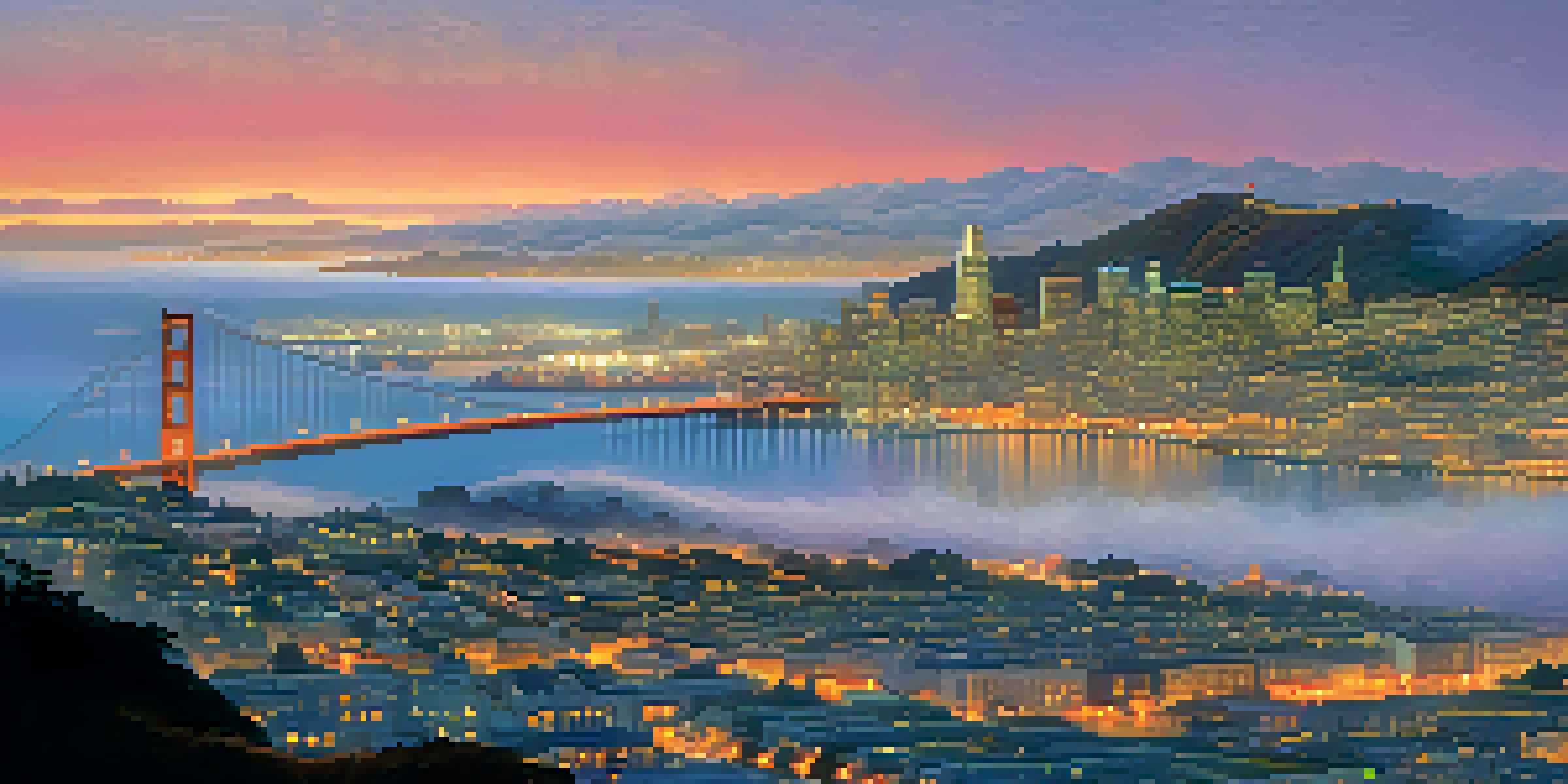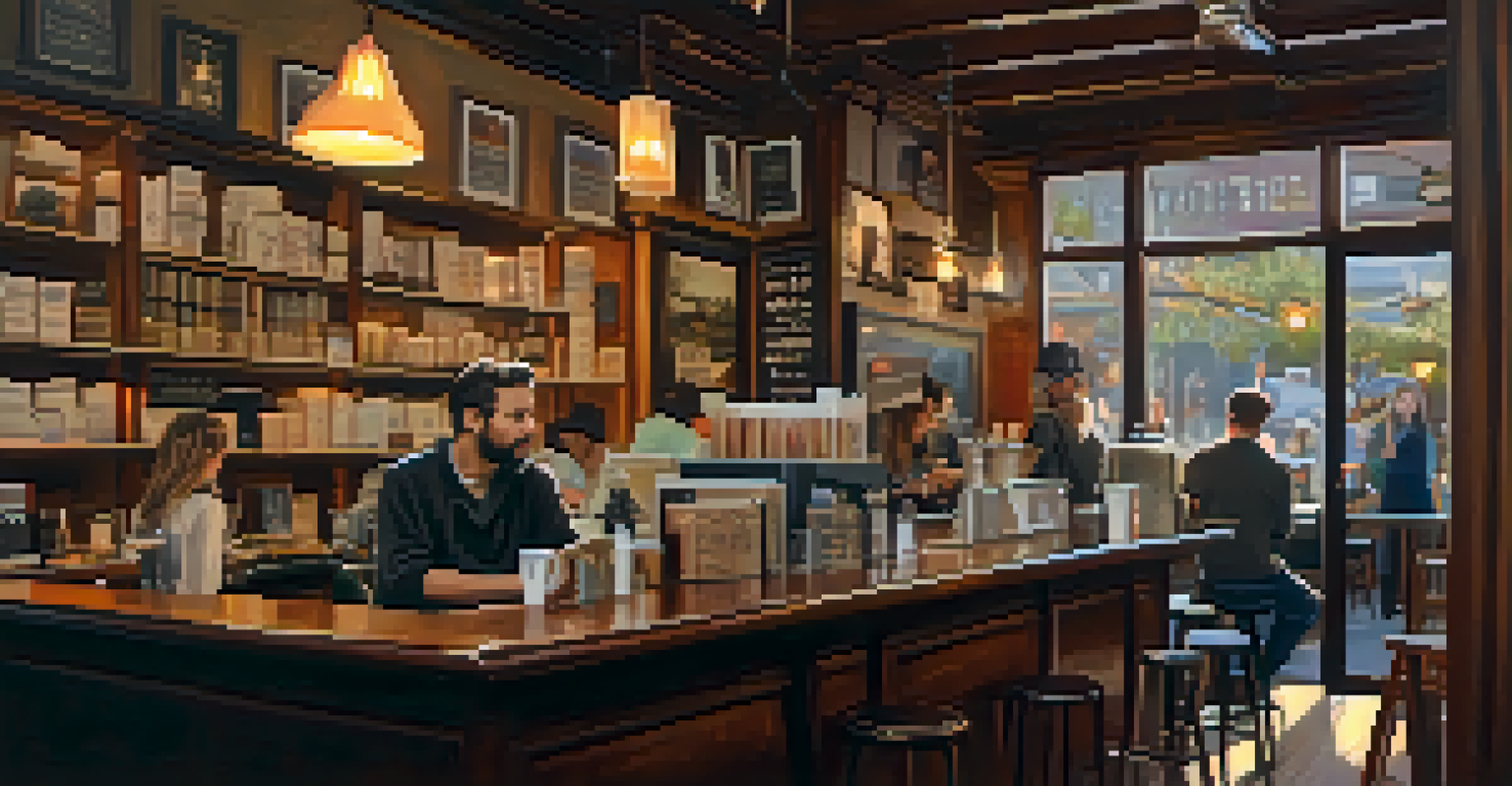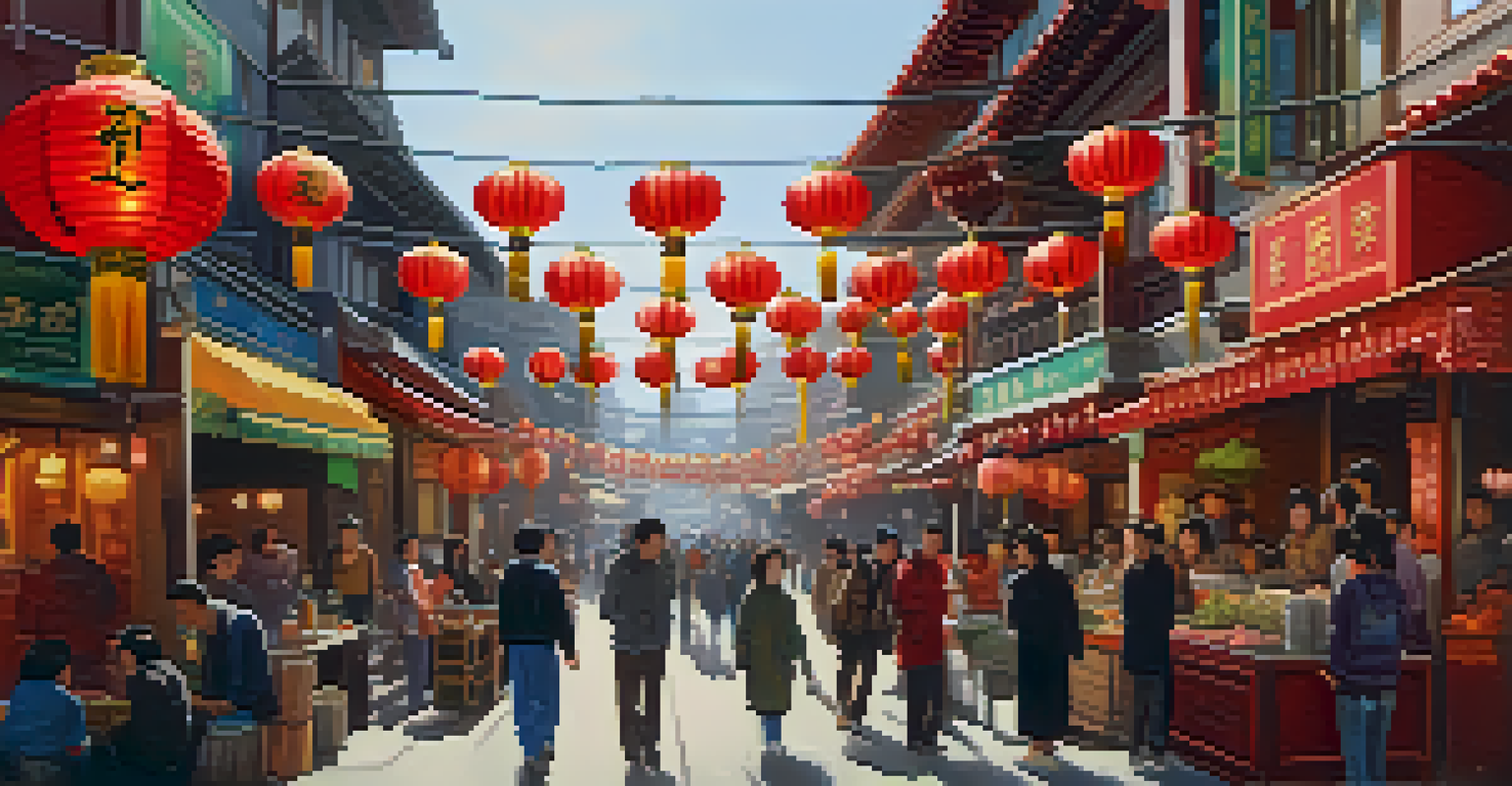The Impact of San Francisco on Modern American Literature

The City as a Literary Muse: An Overview
San Francisco has long been a beacon for writers, drawing them in with its vibrant culture and diverse communities. The city's unique blend of history, architecture, and natural beauty provides endless inspiration for literary exploration. From the foggy shores of the Pacific to the bustling streets of Chinatown, writers find a canvas that reflects their thoughts and emotions.
The city is a book, and those who do not travel read only one page.
Famous authors like Jack Kerouac and Mark Twain found their voices amidst the backdrop of San Francisco. Their works not only encapsulated their experiences but also captured the essence of the city itself. This rich literary heritage has paved the way for modern authors to continue weaving San Francisco's spirit into their narratives.
As a result, the city has become synonymous with literary innovation and experimentation. It has fostered movements, from the Beat Generation to contemporary literary trends, that challenge norms and provoke thought. In this way, San Francisco serves not just as a setting, but as a central character in the story of American literature.
The Beat Generation: A Cultural Revolution
The Beat Generation, emerging in the 1950s, was significantly influenced by San Francisco's countercultural landscape. Writers like Allen Ginsberg and William S. Burroughs used the city as a backdrop for their revolutionary ideas about art, sexuality, and spirituality. Their works challenged the status quo, encouraging a spirit of rebellion and self-exploration that resonated with many.

San Francisco's communal atmosphere, especially in neighborhoods like North Beach, became a sanctuary for these writers. Coffee houses and literary salons buzzed with discussions about existentialism, poetry, and the human experience. This collaborative spirit fostered an environment where innovative ideas could flourish and spread beyond the city's borders.
San Francisco's Literary Heritage
The city's diverse culture and history have inspired countless writers, establishing a rich literary legacy.
The legacy of the Beat Generation continues to inspire modern writers, who often adopt similar themes of freedom and exploration in their own works. The impact of this group on literature cannot be overstated; they opened doors for future generations to express themselves authentically, shaping the narrative of American literature in profound ways.
The Influence of Asian American Literature
San Francisco is home to a rich tapestry of Asian American voices that have significantly contributed to modern literature. Authors like Maxine Hong Kingston and Amy Tan draw from their experiences growing up in a multicultural city, using their narratives to explore themes of identity, belonging, and cultural conflict. Their works reflect the complexities of being both American and Asian, capturing the nuances of immigrant experiences.
Literature is the most agreeable way of ignoring life.
The vibrant community within Chinatown and the surrounding neighborhoods serves as a backdrop for many of these stories. Through their writing, these authors not only share their personal journeys but also highlight the broader Asian American experience, fostering understanding and empathy among diverse audiences.
As Asian American literature continues to gain recognition, it has paved the way for other marginalized voices to be heard. The conversations sparked by these writers challenge stereotypes and broaden the scope of what American literature can encompass, making San Francisco a crucial hub for this literary evolution.
The Role of LGBTQ+ Literature
San Francisco has long been a haven for LGBTQ+ writers, providing a supportive atmosphere that encourages authentic self-expression. The city's rich history of LGBTQ+ activism and community has inspired countless authors to explore themes of love, identity, and social justice in their work. Notable figures like Armistead Maupin have used the city as a backdrop for their narratives, capturing the essence of LGBTQ+ life.
The Castro District, known as the heart of the LGBTQ+ community, has been a focal point for many literary events and gatherings. Here, writers and readers come together to celebrate stories that reflect their realities, fostering a sense of belonging and solidarity. This community-driven approach to literature has helped shape a distinct genre that resonates with many.
Impact of the Beat Generation
The Beat Generation, rooted in San Francisco, transformed literature by promoting themes of rebellion and self-exploration.
As LGBTQ+ literature evolves, it continues to challenge societal norms and push boundaries. The influence of San Francisco on these narratives is undeniable, as the city provides a unique context that amplifies the voices of those often marginalized. This dynamic interplay between place and literature enriches the broader tapestry of American storytelling.
The Tech Boom and Its Literary Reflection
The rise of Silicon Valley has had a profound impact on contemporary literature, with San Francisco at the epicenter of this tech boom. Writers are increasingly exploring themes related to technology, identity, and the human experience in the digital age. This intersection of literature and technology has given birth to new genres and styles that reflect the complexities of modern life.
Authors like Dave Eggers and Jennifer Egan have tackled the implications of technology on society, using their narratives to question the balance between innovation and humanity. Their works often capture the excitement and anxiety that accompany the rapid advancements in technology, offering readers a glimpse into the future.
As technology continues to shape our lives, the literary world responds with stories that resonate with the current zeitgeist. San Francisco, as the heart of this technological revolution, serves as a rich source of inspiration for writers navigating the evolving landscape of modern American literature.
Diversity and Multiculturalism in Literature
San Francisco's diverse population has fostered a rich literary landscape that celebrates multiculturalism. Writers from various backgrounds contribute their unique perspectives, weaving a tapestry of stories that reflect the city's complexity. This blend of cultures enriches the literary scene, making it one of the most vibrant in the country.
Authors like Khaled Hosseini and Julia Alvarez explore themes of immigration and cultural identity, drawing from their own experiences as members of minority communities. Their works resonate with readers from all walks of life, fostering understanding and empathy in an increasingly polarized world. By highlighting the beauty and challenges of multiculturalism, these writers contribute to a more inclusive literary canon.
Diversity Fuels Literary Innovation
San Francisco's multicultural landscape fosters a vibrant literary scene that amplifies diverse voices and perspectives.
As the literary scene continues to evolve, it embraces voices that challenge traditional narratives. San Francisco serves as a microcosm of this movement, showcasing the power of storytelling in bridging cultural divides. The impact of this diversity on modern American literature is profound, as it opens doors for conversations that celebrate our shared humanity.
Literary Festivals: A Hub for Creative Exchange
San Francisco hosts numerous literary festivals that bring together writers, readers, and thinkers from around the world. Events like the Litquake festival create a dynamic space for authors to share their work and engage in meaningful discussions about literature and society. These gatherings not only celebrate the written word but also foster a sense of community among literary enthusiasts.
Festivals often feature a diverse lineup of speakers, showcasing voices from various genres and backgrounds. This exposure to different perspectives enriches the literary experience, allowing attendees to discover new authors and ideas. The collaborative spirit of these events encourages creativity and innovation, inspiring writers to push boundaries in their own work.

As these festivals continue to thrive, they reinforce San Francisco's reputation as a literary hub. The exchange of ideas and experiences at these events plays a crucial role in shaping modern American literature, ensuring that the city's impact on the literary world remains strong and relevant.
Conclusion: San Francisco's Lasting Literary Legacy
In conclusion, San Francisco's influence on modern American literature is both profound and multifaceted. The city's rich history, diverse communities, and vibrant cultural landscape have created an environment where creativity can flourish. From the Beat Generation to contemporary voices, the stories born in San Francisco continue to resonate with readers across the nation.
As writers draw inspiration from the city's unique character, they contribute to a literary legacy that reflects the complexities of the human experience. This ongoing dialogue between place and literature ensures that San Francisco will remain a vital force in shaping the narratives of the future.
The impact of San Francisco on American literature is a testament to the power of storytelling in all its forms. As we celebrate the voices that emerge from this iconic city, we recognize their role in enriching our understanding of ourselves and the world around us.